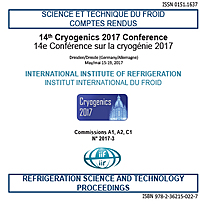
Document IIF
Comprendre les phénomènes physiques qui se produisent à l’intérieur des échangeurs de chaleur lors de la liquéfaction d’hydrogène.
Understanding the physical phenomena that occur inside heat exchangers for liquefaction of hydrogen.
Numéro : pap. n. 06
Auteurs : WILHELMSEN O., SKAUGEN G., BERSTAD D., et al.
Résumé
Liquid hydrogen is an attractive solution for long-range distribution. The largest barriers for implementing large-scale hydrogen liquefaction plants are currently their high energy consumption and cost. The heat exchangers are among the most important equipment in these plants. It has been shown that it may be beneficial to use a mixture of helium-neon ("Nelium") as refrigerant in the cryogenic cooling cycle, because this gives the possibility to utilize highly efficient turbocompressor equipment. In this work, we discuss the physical phenomena that are expected to occur inside cryogenic heat exchangers if Nelium is used as refrigerant for low temperature cooling and liquefaction of hydrogen. We present a detailed heat exchanger model for a simple heat exchanger geometry and study phenomena such as nonequilibrium ortho-para conversion, possible solid-formation of neon and boiling/condensation of Nelium at the lowest temperatures. We elaborate how the physical phenomena can be exploited in the design of more energy- and spaceefficient heat exchanger equipment for hydrogen liquefaction processes.
Documents disponibles
Format PDF
Pages : 7
Disponible
Gratuit
Détails
- Titre original : Understanding the physical phenomena that occur inside heat exchangers for liquefaction of hydrogen.
- Identifiant de la fiche : 30021683
- Langues : Anglais
- Source : Cryogenics 2017. Proceedings of the 14th IIR International Conference: Dresden, Germany, Mai 15-19, 2017.
- Date d'édition : 15/05/2017
- DOI : http://dx.doi.org/10.18462/iir.cryo.2017.0006
- Document disponible en consultation à la bibliothèque du siège de l'IIF uniquement.
Liens
Voir d'autres communications du même compte rendu (71)
Voir le compte rendu de la conférence
Indexation
- Thèmes : Liquéfaction et séparation des gaz
- Mots-clés : Hélium; Liquéfaction; Modélisation; Hydrogène; Neon; Efficacité énergétique; Échangeur de chaleur
-
Comparing the performance of plate-fin and spir...
- Auteurs : SKAUGEN G., WILHELMSEN O.
- Date : 08/05/2019
- Langues : Anglais
- Source : Cryogenics 2019. Proceedings of the 15th IIR International Conference: Prague, Czech Republic, April 8-11, 2019.
- Formats : PDF
Voir la fiche
-
Aspects of hydrogen liquefier scale-up – proces...
- Auteurs : CARDELLA U., DECKER L., KLEIN H.
- Date : 15/05/2017
- Langues : Anglais
- Source : Cryogenics 2017. Proceedings of the 14th IIR International Conference: Dresden, Germany, Mai 15-19, 2017.
- Formats : PDF
Voir la fiche
-
Cooling systems for the temperature level T= 28...
- Auteurs : BONDARENKO V., SYMONENKO I., CHYHRIN A.
- Date : 09/07/2018
- Langues : Anglais
- Source : 2018 Purdue Conferences. 17th International Refrigeration and Air-Conditioning Conference at Purdue.
- Formats : PDF
Voir la fiche
-
Large scale commercial liquid hydrogen plants.
- Auteurs : NAHMIAS D.
- Date : 10/08/1991
- Langues : Anglais
- Source : New challenges in refrigeration. Proceedings of the XVIIIth International Congress of Refrigeration, August 10-17, 1991, Montreal, Quebec, Canada.
- Formats : PDF
Voir la fiche
-
Small scale liquefaction of hydrogen utilizing ...
- Auteurs : ANKERMANN T.
- Date : 10/08/1991
- Langues : Anglais
- Source : New challenges in refrigeration. Proceedings of the XVIIIth International Congress of Refrigeration, August 10-17, 1991, Montreal, Quebec, Canada.
- Formats : PDF
Voir la fiche
